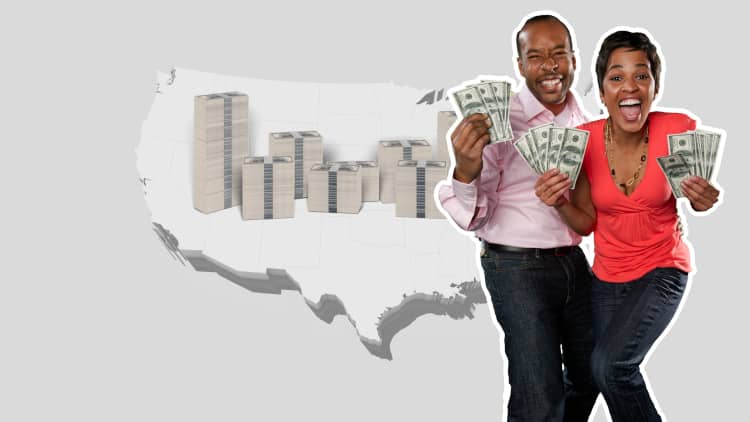President Donald Trump's new tariffs on Chinese products went into effect on Monday. Many Americans are left wondering if they'll end up paying more for the things they buy. Experts predict that the answer is yes.
That's because, while free trade generally increases purchasing power, tariffs can reduce it. And although Commerce Secretary Wilbur Ross claims price increases will go unnoticed, others expect the impact on consumers to be more significant.
"Things are going to become more expensive because of this added tax," best-selling author and personal finance expert Chris Hogan tells CNBC Make It. "This has the potential to impact a lot of areas that people need day to day to survive or to run their business."
The latest round of U.S. tariffs is a 10 percent levy on $200 billion worth of Chinese goods, which is set to rise to 25 percent by the end of the year. That's on top of the $50 billion worth of tariffs on Chinese goods that went into effect in August.
How much more you could pay, and for what
The Office of the United States Trade Representative issued a comprehensive list of Chinese products that the U.S. plans to target. The list includes everything from vegetables and seafood to chemical elements and construction materials.
Including these latest additions, tariffs will cost the average American family $127 per year, according to an analysis from Kirill Borusyak, a postdoctoral associate at Princeton University, and Xavier Jaravel, an economics professor at the London School of Economics. The effect on you will vary based on what you buy, and the extra amount you'll pay could increase significantly if you make more substantial purchases.
Here are some notable goods that may become more expensive for American consumers as a result of the tariffs:
Many American companies have already announced that tariffs could force them to raise prices, including Walmart, Gap, Coca-Cola and General Motors. Macy's also expects to be affected, and some Apple products are expected to get more expensive as well, although not its new smartwatch or wireless headphones.
With tariffs on certain construction materials, houses themselves may jump in price. The U.S. tariffs on Canadian lumber may have already contributed to increased housing costs in the U.S., reports the New York Times. They're "adding about $9,000 to the cost of the average single family home," writes Sandy Weaver, senior adviser at Petrovic Weaver Financial Services, in the Kansas City Star.
"There's no way around it: Tariffs are taxes on American consumers," says David French, senior vice president for government relations at the National Retail Federation. He adds that some prices might increase as soon as the holiday shopping season.
What tariffs do in theory—and in practice
The intent of a tariff, or a tax placed on imported goods, is to benefit domestic companies by making their product more affordable than a foreign alternative. If a car manufacturer suddenly needs to pay a 25 percent tax to import steel, in theory, it will purchase steel from an American supplier instead, and that will benefit the American economy and job market overall.
However, that's not always how things work out.
To offset price hikes, an affected manufacturer might lay off employees or sell its products at a higher cost. For example, Harley-Davidson announced that U.S. tariffs on Canadian steel and aluminum imports could cost the company $45 to $55 million this year, and Weaver speculates that now "your Harley-Davidson motorcycle will likely dent your checkbook for an extra $2,200."
"U.S. tariffs on Chinese imports can drive up prices for consumers, squeeze profit margins of the companies relying on those imports, or both," Greg McBride, chief financial analyst at Bankrate, tells CNBC Make It.

What you can do in response to tariffs
When costs go up, Hogan says there are four things you can do. You can simply pay the additional cost. You can shop around for a product from a company unaffected by the tariff. You can buy something used. Or you can wait.
"I think we have to slow down and really understand the difference between something we want and something we need," says Hogan. "Upgrading a TV from a 50-inch screen to a 60-inch — that's not a need, that's a want." French says big-screen TVs could increase by hundreds of dollars.
If you decide that holding off on a big purchase is your best option, it's not clear exactly how long you'll have to wait. Hogan speculates that tit-for-tat trade negotiations will continue until the second quarter of 2019, at which point new policies could be finalized.
There's no way around it: Tariffs are taxes on American consumers.David Frenchsenior vice president for government relations at the National Retail Federation
Trump tweeted in June that "trade must be fair and no longer a one way street" and "in the end it will even out." The president's goal to narrow the trade deficit with tariffs, or "level the playing field," as Hogan puts it.
The trade deficit is essentially the difference between how much the U.S. imports, in terms of goods and services, and what it exports. It's around $50 billion overall, according to the U.S. Commerce Department, but with China specifically the trade deficit is around $375 billion. Trump claims the gap is a sign of economic weakness, though not all experts agree, and some question, regardless, whether tariffs are an effective response.
In any case, some Americans may feel their effects soon. And it's not just tariffs on imports that can hurt. Last week Beijing announced its plan to impose retaliatory tariffs on 5,000 American goods worth $60 billion in total. Tariffs imposed by other countries can lower sales numbers for American companies and lead to job loss.
"Chinese tariffs on U.S. exports has a more concentrated impact, primarily hitting the revenue and production of U.S. farmers and manufacturers," says McBride.
So, although the eventual effects of this conflict may not be entirely clear, there's some cause for concern about its more immediate impact. "Better trade deals may well be a long-run result," says McBride, "but they won't come without some pain in the meantime."
Don't miss: A 29-year-old bought a $60,000 Tesla with a credit card and earned an estimated $5,000 in rewards
Like this story? Subscribe to CNBC Make It on YouTube!



